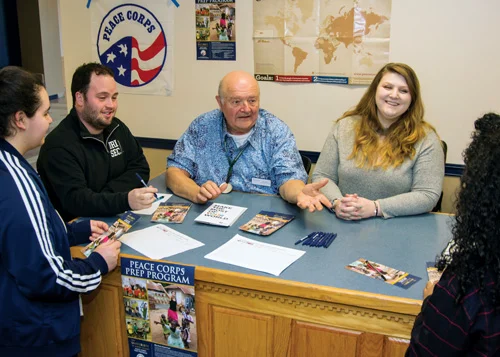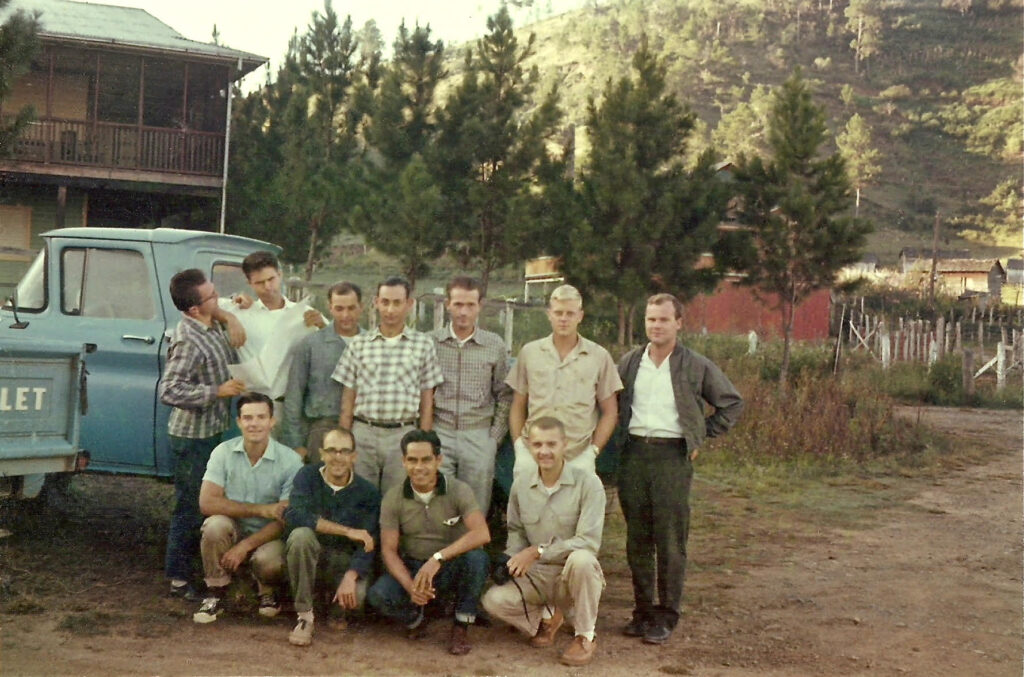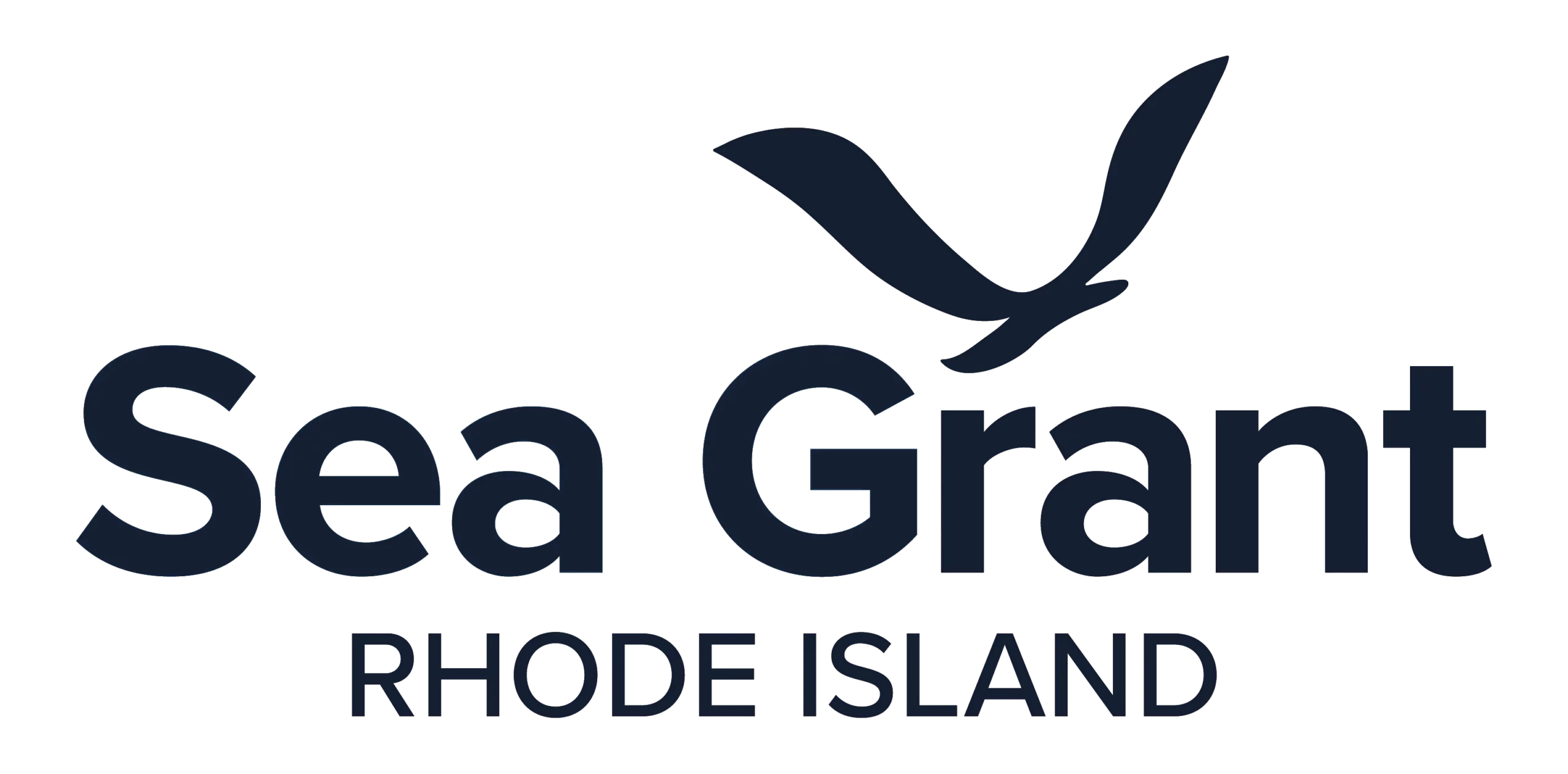
Neil Ross (center) was URI’s first Peace Corps volunteer, as well as Rhode Island Sea Grant’s first extension agent.
When I learned that Neil Ross, Rhode Island Sea Grant’s first extension agent, had passed away, I immediately thought of the one time I had met him several years ago. My boss, Rhode Island Sea Grant Director Dennis Nixon, had suggested that I take the historical sites from Ross’s “Boater’s Guide to Narragansett Bay,” theoretically a guide to notable places visible or visitable by boat, produced for the Bicentennial, and update and add them to our guide to shoreline access, shoreline-ri.com. Ross asked if we were planning to add new sites, since his only went up to the Revolutionary War. Sure, I answered. How hard could it be? After all, he had put his guide, just a fold-out map with references to historic homes, cemeteries, forts, battles, and treaty sites, together decades before GPS made navigating a breeze.
By the end of the summer I had given up on even including all the sites he had originally found. My intrepid student intern had doggedly uncovered hidden fields, unmarked swamps, and historically significant mounds of earth at the ends of winding paths miles from the bay. Not only did I scratch my head over “boater’s guide,” but how, I wondered, had Ross ever found these locations in the first place or figured out what they meant?
I never got the chance to ask him, and now, reading remembrances from those who knew him as well as old newspaper and magazine stories about his life, I realize that the boater’s guide, daunting as it was, was just a blip in a life of service that also included the Peace Corps and Boy Scouts. Read on for remembrances from Mark Amaral, who followed in Ross’s footsteps as an extension agent for Rhode Island Sea Grant and the Coastal Resources Center and who is now CEO of Lighthouse Association Management, and former Rhode Island Sea Grant Director and retired URI Professor Dennis Nixon.
—Monica Allard Cox

Peace Corps forestry group in the Dominican Republic 1963 attending an inservice training program high in the mountains. Neil Ross is in front row kneeling at right end holding camera.
A remembrance by Mark Amaral
Neil Ross, a visionary pioneer in the marina industry, passed away peacefully at his Rhode Island home on Wednesday, October 23, 2024. Known by many as the grandfather of marina training and certification, Neil’s influence on the industry is immeasurable.
A Rhode Island native, Neil graduated from the University of Rhode Island (URI) with a BA in 1962, and again in 1968 with a master’s degree in education. He was a proud URI alumnus and the university’s first Peace Corps volunteer. Following his service, he was hired by the Rhode Island Sea Grant program at URI as New England’s first extension agent. While with Sea Grant, he began his life-long work with the marina industry organizing the nation’s first training classes for marina operators.
In 1986, Neil, along with Paul Dodson and Dennis Nixon, founded the International Marina Institute (IMI). This groundbreaking organization revolutionized the industry by establishing comprehensive training and certification programs, including the globally recognized Certified Marina Manager (CMM) program.
Neil’s tireless efforts, energy, and enthusiasm have left an enduring legacy. He was instrumental in shaping the industry’s response to complex technical and topical challenges, and his impact continues to be felt today. In addition to his work with the CMM program, Neil helped write the original language for the Clean Vessel Act, coined the concept of “marinas as the narrow neck of the hourglass,” and helped spark the clean marina movement. He wrote dozens of articles and reports, spoke at uncountable events, and introduced the “cracker barrel” roundtable to the industry.
Neil’s humor, creativity, and powerful presence inspired thousands of marina professionals. His dedication to educating and empowering marina operators has had a profound impact on the industry. He will be deeply missed by his family, friends, and the countless individuals whose lives he touched.
A Remembrance by Dennis Nixon
Neil was asked by a local marina operator, Charlie Dickerson, why it was that “environmentalists” were criticizing marinas when he could see marine life everywhere in his. This was the early to mid-1970s. Charlie asked Neil if he could find someone at URI to “look into it” and separate fact from fiction.
Neil convinced a young GSO scientist by the name of Scott Nixon to do just that, and the first director of Rhode Island Sea Grant, Professor Niels Rorholm, provided the funding for what was, as I recall, the first multi-year and multi-location study of its kind. The result became one of Rhode Island Sea Grant’s most famous publications, The Ecology of Small Boat Marinas. It was one of the first balanced, scientifically based studies of its kind with no hidden agendas. It’s still worth a read today.
Scott, of course, went on to a distinguished career as a GSO scientist and director of Rhode Island Sea Grant for many years. And my tenure as the director of Sea Grant from 2012–2020 saw the long-term Sea Grant/marine trades industry relationship continue to grow as we pioneered the process of recycling end-of-life fiberglass boats. Neil had an enormous influence on all of us, and I am proud to have known him as a friend and colleague.
Photos courtesy of The University of Rhode Island Magazine.
Read the obituary
